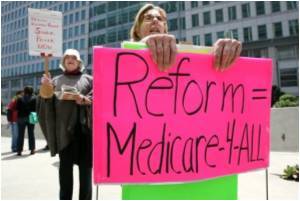The rising cost of Medicare can be cut through strategies such as raising the eligibility age and increasing premiums.

Researchers simulated the likely outcomes of three approaches for lowering Medicare costs -- imposing a premium for Medicare's hospital insurance, switching to a premium support program that subsidizes the cost of purchasing private coverage, and increasing the eligibility age to 67. Each approach has been widely discussed as a way to slow rising Medicare costs.
Researchers found that adding a means-tested premium for Medicare Part A would cut spending by 2.4 percent, while increasing the eligibility age would trim spending by 7.2 percent. The largest savings would come from a move to a premium support or voucher plan, which could cut spending by up to 24 percent if pegged to growth in the consumer price index, according to the findings published in the May edition of the journal Health Affairs.
But each of the approaches would cause some seniors to lose Medicare coverage. The analysis showed that imposing a premium on hospital coverage would trim enrollment by nearly 2 percent and increasing the eligibility age to 67 would cut the number of seniors covered by Medicare by about 14 percent. A premium support program could prompt between 4 percent and 13 percent of seniors to drop coverage, due to divergence over time between the cost of coverage compared to the amount of the credit.
"Each of these policies can save money for the Medicare program," said Christine Eibner, the study's lead author and a senior economist at the RAND Corporation, a nonprofit research organization. "The question is what to do about those people who lose Medicare as the cost rises or they are excluded. Those people may not be able to find alternative health coverage."
Researchers warn that increasing the number of uninsured elderly Americans would put a strain on hospital emergency departments and could pose a serious consequence for population health.
Advertisement
Researchers examined the likely impact of three policy options that have been widely discussed, modeling the likely impacts of each strategy if it was imposed beginning in 2014 and running through 2036.
Advertisement
Increasing the Medicare eligibility age to 67 has been proposed on many occasions and mirrors a change made for full Social Security eligibility.
Changing Medicare to a program that provides older Americans with voucher or other premium support to purchase health insurance coverage has been proposed by several groups, including U.S. Rep. Paul Ryan. Researchers modeled the impact of such a program tied to the current cost of Medicare, with future cost increases pegged to the growth of the nation's gross domestic product or, in an alternative scenario, the consumer price index.
"Each of the policies we examined would require sacrifices in eligibility and in higher costs imposed on Medicare enrollees," Eibner said. "As policymakers look for ways to curb the growth of Medicare spending, they must weigh the costs and benefits of the many alternatives."
Source-Eurekalert











